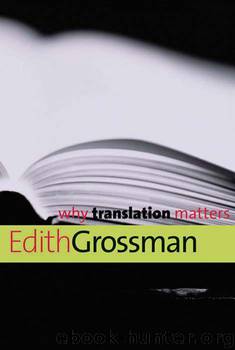Why Translation Matters (Why X Matters Series) by Edith Grossman

Author:Edith Grossman [Grossman, Edith]
Language: eng
Format: epub
ISBN: 9780300126563
Publisher: Yale University Press
To my mind, a translator's fidelity is not to lexical pairings but to context—the implications and echoes of the first author's tone, intention, and level of discourse. Good translations are good because they are faithful to this contextual significance. They are not necessarily faithful to words or syntax, which are peculiar to specific languages and can rarely be brought over directly in any misguided and inevitably muddled effort to somehow replicate the original. This is the literalist trap, because words do not mean in isolation. Words mean as indispensable parts of a contextual whole that includes the emotional tone and impact, the literary antecedents, the connotative nimbus as well as the denotations of each statement. I believe—if I didn't, I could not do the work—that the meaning of a passage can almost always be rendered faithfully in a second language, but its words, taken as separate entities, can almost never be. Translators translate context. We use analogy to recreate significance, searching for the phrasing and style in the second language which mean in the same way and sound in the same way to the reader of that second language. And this requires all our sensibility and as much sensitivity as we can summon to the workings and nuances of the language we translate into.
To balance the clear presumption of my criticizing Nabokov's theories of translation, I would like to cite John Dryden. In the preface to his translation of Ovid's Epistles, published in 1680, Dryden called literal translations “servile,” and then, in his conclusion, he articulated, in perfectly eloquent language, his surprisingly modern approach to the issue of the translator's obligations:
A translator that would write with any force or spirit of an original must never dwell on the words of his author. He ought to possess himself entirely and perfectly comprehend the genius and sense of his author, the nature of the subject, and the terms of the art or subject treated of. And then he will express himself as justly, and with as much life, as if he wrote an original: whereas he who copies word for word loses all the spirit in the tedious transfusion. (31)
Download
This site does not store any files on its server. We only index and link to content provided by other sites. Please contact the content providers to delete copyright contents if any and email us, we'll remove relevant links or contents immediately.
4 3 2 1: A Novel by Paul Auster(12363)
The handmaid's tale by Margaret Atwood(7750)
Giovanni's Room by James Baldwin(7316)
Asking the Right Questions: A Guide to Critical Thinking by M. Neil Browne & Stuart M. Keeley(5751)
Big Magic: Creative Living Beyond Fear by Elizabeth Gilbert(5746)
Ego Is the Enemy by Ryan Holiday(5411)
The Body: A Guide for Occupants by Bill Bryson(5075)
On Writing A Memoir of the Craft by Stephen King(4925)
Ken Follett - World without end by Ken Follett(4718)
Adulting by Kelly Williams Brown(4564)
Bluets by Maggie Nelson(4542)
Eat That Frog! by Brian Tracy(4514)
Guilty Pleasures by Laurell K Hamilton(4437)
The Poetry of Pablo Neruda by Pablo Neruda(4089)
Alive: The Story of the Andes Survivors by Piers Paul Read(4017)
White Noise - A Novel by Don DeLillo(3999)
Fingerprints of the Gods by Graham Hancock(3984)
The Book of Joy by Dalai Lama(3968)
The Bookshop by Penelope Fitzgerald(3842)
